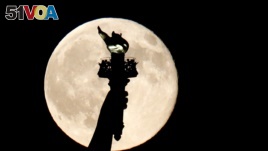31 October 2020
And now, Words and Their Stories, from VOA Learning English.
On this program we take an English word or expression and explore it a little deeper. Today we are talking about a lunar phenomenon – a moon event. It's called a blue moon.

In this July 31, 2015, file photo, a blue moon rises behind the torch of the Statue of Liberty seen from Liberty State Park in Jersey City, N.J. A blue moon happens when the moon rises in its full stage twice during the same month. (AP Photo/Julio Cortez)
Experts at the U.S. National Aeronautics and Space Administration (NASA) explain this lunar event. They say a blue moon is the "extra" moon in a season with four full moons.
The NASA website says that "since the 1940s, the term ‘blue moon' has also been used for the second full moon in a calendar month." This usually happens only every two-and-a-half years.
The NASA experts explain that a blue moon is not actually blue in color. In fact, it looks the same as a regular monthly full moon.
What makes a blue moon different is that it does not appear in the sky that often. And this is how we use it as an English expression.
A "blue moon" is a long or seemingly long period of time.
If I say something happens "once in a blue moon," it is uncommon, infrequent, rare. It happens very seldom. These words all describe something that happens once in a blue moon.
For example, I usually keep busy. So when I'm not working, I like to take sing songs, write stories or read books. But sometimes, I just like to do nothing. So, once in a blue moon, you'll find me on the couch, watching movies and eating popcorn.
Here's another example.
Let's say you have a friend who you do not see very much anymore. You can say you see him once in a blue moon. It feels like an eternity since you have talked. It's like he has dropped off the face of the Earth! You can also say it has been forever since you have seen him.
Forever is a long time. So, forever and a day is even longer! And it has been forever and a day since you have seen your friend. You miss him! You should call.
And finally, here is our last example. If you have been busy, you may not have had time to practice your English. But just remember, if you only practice once in a blue moon, your English may not improve very quickly.
So, join us again next week for another Words and Their Stories! Until next time ... I'm Anna Matteo.
Blue moon of Kentucky, keep on a-shining Shine on the one that's gone and left me blue, Blue moon of Kentucky, keep on a-shining, shine on the one that's gone and left me blue ...Anna Matteo wrote this story for VOA Learning English. Bryan Lynn was the editor. The song at the beginning of the program is Billie Holliday singing "Blue Moon." The song at the end is Patsy Cline singing "Blue Moon."
_________________________________________________
Words in This Story
lunar – adj. of or relating to the moon
phenomenon – n. something (such as an interesting fact or event) that can be observed and studied and that typically is unusual or difficult to understand or explain fully
infrequent – adj. not happening often : not frequent
rare – adj. very uncommon
seldom – adj. not often : almost never
eternity – n. time that seems to be without an end